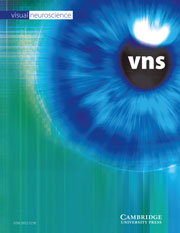Crossref Citations
This article has been cited by the following publications. This list is generated based on data provided by
Crossref.
Smith, Andrew T.
Greenlee, Mark W.
Singh, Krish D.
Kraemer, Falk M.
and
Hennig, Jürgen
1998.
The Processing of First- and Second-Order Motion in Human Visual Cortex Assessed by Functional Magnetic Resonance Imaging (fMRI).
The Journal of Neuroscience,
Vol. 18,
Issue. 10,
p.
3816.
Braun, Doris
Petersen, Dirk
Schönle, Paul
and
Fahle, Manfred
1998.
Deficits and recovery of first- and second-order motion perception in patients with unilateral cortical lesions.
European Journal of Neuroscience,
Vol. 10,
Issue. 6,
p.
2117.
Croner, Lisa J.
and
Albright, Thomas D.
1999.
Segmentation by Color Influences Responses of Motion-Sensitive Neurons in the Cortical Middle Temporal Visual Area.
The Journal of Neuroscience,
Vol. 19,
Issue. 10,
p.
3935.
Wandell, Brian A.
1999.
COMPUTATIONAL NEUROIMAGING OF HUMAN VISUAL CORTEX.
Annual Review of Neuroscience,
Vol. 22,
Issue. 1,
p.
145.
Okusa, T
Kakigi, R
and
Osaka, N
2000.
Cortical activity related to cue-invariant shape perception in humans.
Neuroscience,
Vol. 98,
Issue. 4,
p.
615.
Vaina, Lucia M.
Soloviev, Sergei
Bienfang, Don C.
and
Cowey, Alan
2000.
A lesion of cortical area V2 selectively impairs the perception of the direction of first-order visual motion.
NeuroReport,
Vol. 11,
Issue. 5,
p.
1039.
Baker, Curtis L.
and
Mareschal, Isabelle
2001.
Vision: From Neurons to Cognition.
Vol. 134,
Issue. ,
p.
171.
Churan, Jan
and
Ilg, Uwe J.
2001.
Processing of second-order motion stimuli in primate middle temporal area and medial superior temporal area.
Journal of the Optical Society of America A,
Vol. 18,
Issue. 9,
p.
2297.
Nishida, Shin'ya
Sasaki, Yuka
Murakami, Ikuya
Watanabe, Takeo
and
Tootell, Roger B. H.
2003.
Neuroimaging of Direction-Selective Mechanisms for Second-Order Motion.
Journal of Neurophysiology,
Vol. 90,
Issue. 5,
p.
3242.
Brodeur, Mathieu
and
Bruno Debruille, J
2003.
Visual evoked potentials to line- and luminance-defined triangles.
Vision Research,
Vol. 43,
Issue. 3,
p.
299.
Wachtler, Thomas
Sejnowski, Terrence J
and
Albright, Thomas D
2003.
Representation of Color Stimuli in Awake Macaque Primary Visual Cortex.
Neuron,
Vol. 37,
Issue. 4,
p.
681.
Johnson, Aaron P.
and
Baker, Curtis L.
2004.
First- and second-order information in natural images: a filter-based approach to image statistics.
Journal of the Optical Society of America A,
Vol. 21,
Issue. 6,
p.
913.
Guo, Kun
Benson, Philip J.
and
Blakemore, Colin
2004.
Pattern motion is present in V1 of awake but not anaesthetized monkeys.
European Journal of Neuroscience,
Vol. 19,
Issue. 4,
p.
1055.
Bourne, J. A.
Lui, L.
Tweedale, R.
and
Rosa, M. G. P.
2004.
First‐ and second‐order stimulus length selectivity in New World monkey striate cortex.
European Journal of Neuroscience,
Vol. 19,
Issue. 1,
p.
169.
Johnson, Aaron P.
Kingdom, Frederick A.A.
and
Baker, Curtis L.
2005.
Spatiochromatic statistics of natural scenes: first- and second-order information and their correlational structure.
Journal of the Optical Society of America A,
Vol. 22,
Issue. 10,
p.
2050.
Peterhans, E.
Heider, B.
and
Baumann, R.
2005.
Neurons in monkey visual cortex detect lines defined by coherent motion of dots.
European Journal of Neuroscience,
Vol. 21,
Issue. 4,
p.
1091.
Noguchi, Yasuki
and
Kakigi, Ryusuke
2005.
Neural mechanisms of visual backward masking revealed by high temporal resolution imaging of human brain.
NeuroImage,
Vol. 27,
Issue. 1,
p.
178.
LEDGEWAY, TIMOTHY
ZHAN, CHANG'AN
JOHNSON, AARON P.
SONG, YUNING
and
BAKER, CURTIS L.
2005.
The direction-selective contrast response of area 18 neurons is different for first- and second-order motion.
Visual Neuroscience,
Vol. 22,
Issue. 1,
p.
87.
Noguchi, Yasuki
Kaneoke, Yoshiki
Kakigi, Ryusuke
Tanabe, Hiroki C.
and
Sadato, Norihiro
2005.
Role of the Superior Temporal Region in Human Visual Motion Perception.
Cerebral Cortex,
Vol. 15,
Issue. 10,
p.
1592.
Hock, Howard S.
and
Gilroy, Lee A.
2005.
A common mechanism for the perception of first-order and second-order apparent motion.
Vision Research,
Vol. 45,
Issue. 5,
p.
661.


